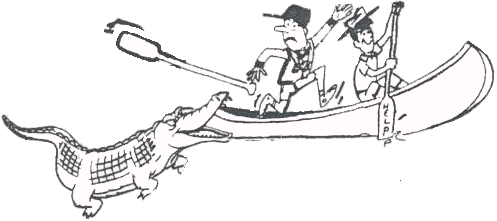

Here's a little History on the Race!
The Neches Wilderness Canoe Race began as a fund raiser sponsored by the Trinity Valley Community College Palestine Chapter of Phi Theta Kappa, the National Honor Fraternity for American Junior Colleges. When Candice Dillon asked Ed Furman "What we can do for our scholarship fundraiser?" Ed, who is was race director the first 20 years of the race and started paddling aluminum to get his boy scout merit badge years ago in N.Y. state, says the first thing that popped into his head was "canoe race!". Well, the rest is history as they say. Upon graduation from TVCC the founders of the race, committed to the goal of meeting the educational needs of our community, continued the tradition of "running the waters" to benefit others. Now, thanks to the large group of community volunteers and generous race sponsors that make it possible, in its' 19th year the Neches Race has become on of Texas' most successful paddling events and has earned a national reputation as on of the best organized and most challenging races around. It's become a tradition around Texas, regularly attracting one of the largest fields of paddlers in the state. And the scholarship fund? It's grown right along with the race. Over the past 22 years funds in excess of over $20,000 have provided over 85 scholarships to deserving college students. The scholarship program benefits a variety of students including returning adults, single parents, veterans and recent high school graduates. In addition, the race positively impacts the tourism economy of Palestine and Anderson County. Why the success? Ed says it's because "if you do things for the right reasons, things just seem to work out. "
Along with the good cause of the scholarship fund the excitement of the challenging Neches River race course keeps paddlers coming back every year for more of "Neches", drawing from both the highly skilled marathon and adventure racing crowd and the recreational paddler. "There is absolutely nothing like Neches from the venue and unpredictability of it to the people that put it on." says Erin McGee, a U.S World Cup Kayaker and regular race entrant. Ed Furman says "Neches' is one of the toughest flatwater races in the state. Lots of obstacles-no current." In other words lots of fallen trees and stumps and being in the low water typical of late summer. The kind of conditions that appeal to a cross cut of paddling types. Plenty of challenge without the hazards associated with the fast moving river. Conditions that act as an equalizer to the race field, taking away some of the advantage of hull designs and handing it the the resourceful. " 'Old aluminums', kayaks, sit-on-tops do well at Neches and even unlimited solos and tandems for those that have the skills to handle them. There are no homes or development of any kind along the river. All you will hear is the sound of your paddle and the sound of a competitor breathing down your neck... The average canoeist may make the flatwater trip in 3-10 hours depending upon the individuals skill and equipment used. Skilled canoeists have considered this the toughtest 'little' race in Texas" (a reference to the Texas Water Safari, billed as the 'world's toughest canoe race') "...but the bottom line is that this is a fun oriented event and even for those who choose a leisurely paced race, it is a good opportunity to experience nature on the beautiful Neches River Trail." - Ed Furman
The race is set up with two classes of paddlers: leisure class and pro class. The leisure class. start one hour before the pro class which means that the pro classes don't run off and leave the rest of the paddling field. They, by starting and hour later, will have to catch up to the leisure class and maneuver their way around and through the slower paddlers in order to make their way to the front of the pack, giving them, in effect, an added obstacle to overcome and giving both classes more time on the river together. This really adds another crazy element to the race and gives the leisure paddlers a chance to see what it's like to "really" go fast in a canoe or kayak. Water stations and check points are setup at two locations along the racecourse, with race volunteers monitoring paddlers' condition, and providing water to anyone needing it. Radio operators are stationed along the way to provide instant contact to emergency personnel should it be necessary.
At the finish line race volunteers pull canoes from the river for the weary paddlers and everyone enjoys hamburgers, cold drinks and watermelon. The shuttle starts to run, taking racers to the starting line to pick up autos. Awards are presented when all paddlers in a class have crossed the finish line. A drag boat sweeps the river from starting line to finish to make sure no stragglers remain on the river.


